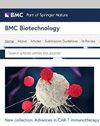CO2 和 COBZ21 两种红海海绵曲霉共培养诱导产生抗菌和抗氧化代谢物
IF 3.4
3区 生物学
Q2 BIOTECHNOLOGY & APPLIED MICROBIOLOGY
引用次数: 0
摘要
传染病的日益蔓延已成为全球人类健康的潜在威胁。根据世卫组织的报告,我们在本研究中调查了将分离的内生真菌黑曲霉 CO2 和芽孢杆菌 COBZ21 共同培养作为刺激天然生物活性物质生产的一种方法的影响。(基于气相色谱/质谱(GC/MS)的代谢组学分析对两种海绵相关微生物--黑曲霉 CO2 和芽孢杆菌 COBZ21 进行了分析,结果表明这两种分离菌的共培养诱导了代谢物的积累,而这些代谢物在它们的轴向培养物中是找不到的。通过检测 COBZ21 芽孢杆菌和 CO2 黑曲霉的提取物以及 COBZ21 芽孢杆菌和 CO2 黑曲霉的共培养物的不同活性,发现共培养策略可使 COBZ21 芽孢杆菌和 CO2 黑曲霉的代谢产物积累得更多。结果表明,由于采用了共培养策略,一些不同的活性得到了显著提高,如抗菌活性,对大肠杆菌 ATCC 25,922 、金黄色葡萄球菌 NRRLB-767 和白色念珠菌 ATCC 10,231 均有很强的活性。抗生物膜活性显示,它对枯草芽孢杆菌 ATCC 6633、铜绿假单胞菌 ATCC 10,145 和金黄色葡萄球菌 NRRLB-767 具有显著的生物膜抑制活性,活性分别高达 53.66%、71.17% 和 47.89%,而对大肠杆菌 ATCC 25,922 的活性较低。气相色谱-质谱(GC-MS)研究显示,存在属于不同化学类别的可变化学成分,这反映了其化学多样性。主要成分为 (+-) 顺式-去乙基伯纳明(2.66%)、双(3,6,9,12-四氧杂五乙烯)冠-N,N,N',N'-四甲基泼二胺(2.48%)和 11-苯基-2,4,6,8-四(2-噻吩基)-11-氮杂-5,13-二硫杂三环[7.3.0.1(2,8)0.0(3,7)]三十-3,6-二烯-10,12,13-三酮(3.13%)。通过研究共培养提取物的 ADME 相关理化性质,该化合物的 Po/w 对数值高于 5(8.82)。该物质的溶解度适中。为了对药物化学和铅粘性进行全面定义,必须指出后者不符合三规则(RO3)中规定的标准。使用 ProTox II 网络服务器对共培养提取物进行了毒性预测,结果显示所选化合物没有明显的毒性。本文章由计算机程序翻译,如有差异,请以英文原文为准。
Induction of antimicrobial, antioxidant metabolites production by co-cultivation of two red-sea-sponge-associated Aspergillus sp. CO2 and Bacillus sp. COBZ21
The growing spread of infectious diseases has become a potential global health threat to human beings. According to WHO reports, in this study, we investigated the impact of co-cultivating the isolated endophytic fungus Aspergillus sp. CO2 and Bacillus sp. COBZ21 as a method to stimulate the production of natural bioactive substances. (GC/MS)-based metabolomics profiling of two sponge-associated microbes, Aspergillus sp. CO2 and Bacillus sp. COBZ21, revealed that the co-culture of these two isolates induced the accumulation of metabolites that were not traced in their axenic cultures. By detection of different activities of extracts of Bacillus sp. COBZ21 and Aspergillus sp. CO2 and coculture between Bacillus sp. COBZ21 and Aspergillus sp. CO2. It was noted that the coculture strategy was the reason for a notable increase in some different activities, such as the antimicrobial activity, which showed potent activity against Escherichia coli ATCC 25,922, Staphylococcus aureus NRRLB-767, and Candida albicans ATCC 10,231. The antibiofilm activity showed significant biofilm inhibitory activity toward Bacillus subtilis ATCC 6633, Pseudomonas aeruginosa ATCC 10,145, and Staph aureus NRRLB-767, with activity up to 53.66, 71.17, and 47.89%, while it showed low activity against E. coli ATCC 25,922, while the antioxidant activity based on the DPPH assay showed maximum activity (75.25%). GC-MS investigations revealed the presence of variable chemical constituents belonging to different chemical categories, which reflected their chemical diversity. The main components are (+-) cis-Deethylburnamine (2.66%), Bis(3,6,9,12-tetraoxapentaethylene) crowno-N,N,N’,N’-tetra methylpphanediamine (2.48%), and 11-phenyl-2,4,6,8-tetra(2-thienyl)-11-aza-5,13-dithiaeteracyclo[7.3.0.1(2,8)0.0(3,7)] trideca-3,6-diene-10,12,13-trione (3.13%), respectively, for Bacillus sp. axenic culture, Aspergillus sp. CO2, Aspergillus sp. CO2, and Bacillus sp. COBZ21 coculture. By studying the ADME-related physicochemical properties of coculture extract, the compound showed log Po/w values above 5 (8.82). The solubility of the substance was moderate. In order to provide a comprehensive definition of medicinal chemistry and leadlikness, it is important to note that the latter did not meet the criteria outlined in the rule of three (RO3). The toxicity prediction of the coculture extract was performed using the ProTox II web server, which showed that the selected compound has no pronounced toxicity.
求助全文
通过发布文献求助,成功后即可免费获取论文全文。
去求助
来源期刊

BMC Biotechnology
工程技术-生物工程与应用微生物
CiteScore
6.60
自引率
0.00%
发文量
34
审稿时长
2 months
期刊介绍:
BMC Biotechnology is an open access, peer-reviewed journal that considers articles on the manipulation of biological macromolecules or organisms for use in experimental procedures, cellular and tissue engineering or in the pharmaceutical, agricultural biotechnology and allied industries.
 求助内容:
求助内容: 应助结果提醒方式:
应助结果提醒方式:


